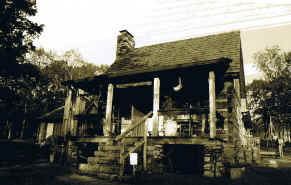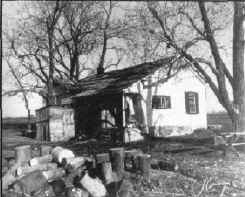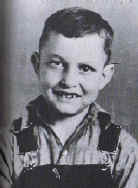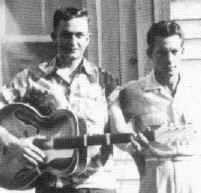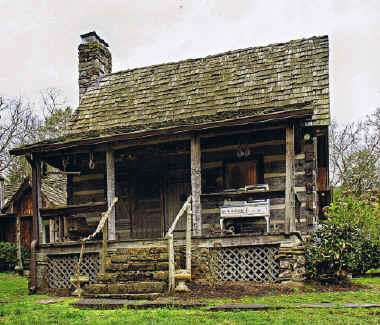Johnny Cash

Although his greatest significance came in the late '60s when he
popularized country and western music with the mainstream
audience and became the first international country star, Johnny
Cash was one of the first rockabilly stars of the '50s, along
with Sun stablemates Carl Perkins, Jerry Lee Lewis, and Elvis
Presley.
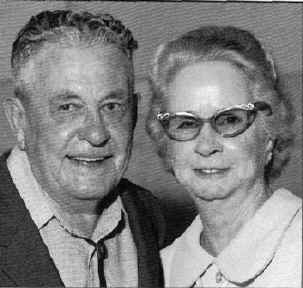
Ray and Carrie Cash
Johnny Cash was born in rural, south-central
Arkansas, on February 26, 1932. His birth place is almost
directly across the Mississippi from Lake County where Carl
Perkins was born six weeks later. The family moved to Dyess,
Arkansas when he was three. His father Ray Cash, was a farmer,
hobo, and odd job laborer.
The move to Dyess meant hope to the poverty
stricken Cash Family. Ray and his son Roy, worked hard
developing their government subsidized farm and when Johnny
was older he joined them. After working in the fields during the
day, Johnny would listen to the radio at night, picking out the
Memphis stations with their mix of country and blues songs.
Johnny began composing songs, his first at the age of 12,
combining the best of both styles. His family, especially his
mother Carrie, encouraged him.

Switzerland 1951
|

John and Vivian Liberto Cash
|
When he was older, he left home to work in Pontiac, MI. The
job lasted only two weeks before he returned home to Arkansas. On
July 7,1950 he enlisted in the Air Force, Before leaving Cash
went roller skating in San Antonio, Texas. There he met Vivian
Liberto, then seventeen and in her last year of high school. They
dated a few weeks and wrote each other while Cash was overseas.
They decided to get married when he returned. It was while he was
stationed in Germany, that he bought his first guitar. He began
setting his songs to music, and one of the first was "Folsom
Prison Blues."

On July 3, 1954 Cash was discharged from the Air
Force. On August 7, 1954 he married Vivian Liberto and set up
home on Tutwiller Avenue in Memphis. His older brother Ray found
him a job selling appliances.
Trying to break in to the music business Cash
auditioned for a job as a radio announcer at a station in Corith,
Mississippi, but was turned down because lack of experience.
Using his G.I. benefits, Cash then enrolled at the Keegan School
of Broadcasting in Memphis .
A few days after getting out of the service, Cash
visited his older brother Roy in Memphis. Roy Cash was working at
Hoehn Chevrolet where he worked with three mechanics who played
together at home, small benefit concerts and Sunday morning
radio. One of the three was Luther Perkins who would later
develop the guitar sound that complemented Cash's stark baritone.
was during this time that he met Luther Perkins and Marshall
Perkins. The three decided to try and be professional
entertainers. They approached Sun Records, but Sam Phillips was
busy promoting Elvis Presley's first records. Eventually with
Cash playing guitar and singing in his deep baritone voice of
exceptionally low and narrow range, they auditioned for Phillips
in March, 1955.

Johnny Cash and the Tennesse Two
L to R: Luther Perkins, Johnny Cash and Marshall Grant
Signed to Sun as Johnny Cash and the Tennessee
Two, their first single, "Cry, Cry, Cry," became a
moderate country hit. After the two sided smash "So Doggone
Lonesome" b/w "Folsom Prison Blues," the group had
their first major pop/country hit with Cash's own "I Walk
the Line" in 1956. The group appeared on the Louisiana
Hayride in December 1955, becoming regulars, before graduating to
the Grand Ole Opry in July 1956. They subsequently achieved major
pop/top country hits with "Ballad of a Teenage Queen"
and "Guess Things Happen That Way" in 1958. That year
the group became Johnny Cash and the Tennessee Three with the
addition of W.S. Holland, one of country music's first drummers.
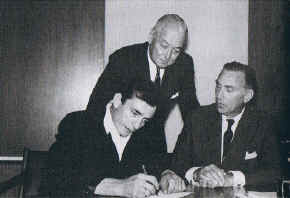
Signing contract with Columbia
Photo courtesy Saul Holiff Collection
On August 1958, the group switched to Columbia
Records, soon having a moderate pop/top hit with "Don't Take
Your Guns to Town." Leaving the Grand Ole Opry and moving to
California, Cash started working with June Carter of the
legendary Carter Family, in 1961. feeling the strain of constant
touring, and the collapse of his first marriage and death of
friend Johnny Horton, Cash began taking amphetamines and
tranquilizers to cope. In 1963 he scored his first major pop/top
hit with Columbia with "Ring of Fire."
Cash soon began frequenting the Greenwich Village
folk music scene and his next moderate hit "Understand Your
Man" had a definite folk feel. In 1964 he appeared with Bob
Dylan at the Newport Folk Festival and recorded Bitter Tears, his
tribute to the plight of the American Indian. It yielded a smash
country hit "Ballad of Ira Hayes," and soon Cash and
June Carter scored a country hit with Dylan's "It Ain't Me
Babe." Cash's 1965 album Orange Blossom Special
yielded a smash country hit/ moderate pop hit with the title
song.

|
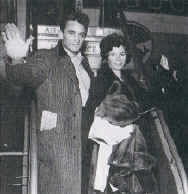
June Carter
|
Despite increasing popular success, Cash's life
seem to deteriorate. In October 1965 he was arrested at the El
Paso international airport in possession of stimulants and
tranquilizers. After being found near death in a small
Georgia town in 1967, Cash decided to reform. With June Carter
providing moral support he cleaned up his act. The pair had a
smash hit with "Jackson" in 1967 and married in March
1968. In early 1970 they had a smash/moderate pop hit with
"If I Were a Carpenter."
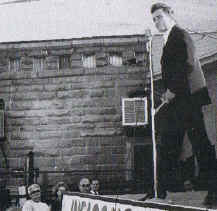
Folsom Prison 1966
Luther Perkins died accidentally in 1968 and was
replaced by Bob Wooten. The 1968 album Johnny Cash at Folsom
Prison revitalized his career and made him an international
star. The album yielded a top country/moderate pop hit
"Folsom Prison Blues." Cash had another top country/
smash pop hit with the novelty tune "A Boy Named Sue"
from Johnny Cash at San Quentin, another best seller.In early
1969 Cash had another country and pop hit with Carl Perkin's
"Daddy Sang Bass."
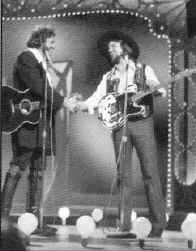
With Waylon Jennings on CBS special
In 1969 Cash's ABC television series debuted
featuring a film of Cash and Bob Dylan recording "Girl from
the North Country." The song later appeared on Dylan's
Nashville Skyline, Dylan's first country album. Later shows
featured such artists as Gordon Lightfoot, Kris Kristofferson,
Waylon Jennings, and Joni Mitchell. During the 70s daughter
Roseanne Cash and step-daughter Carlene Cash worked with the
Johnny Cash Road Show.
Cash demonstrated his social consciousness in the
early '70s with the hits "What Is Truth" and "The
Man in Black." He also narrated and co-produced the
soundtrack to the Christian epic Gospel Road and
assisted in the production of The Trail of Tears, a
dramatization of the tragedy of the Cherokee Indians, broadcast
on public television.
Cash scored a top country/ major pop hit (his
last) with the novelty song "One Piece at a Time" in
1976 and a smash country hit with "There Ain't No Good Chain
Gangs" recorded with Waylon Jennings. In 1980 Cash returned
to his early style of music, recording Rockabilly Blues with Nick
Lowe and Dave Edmunds of Rockpile. His last major country hit
came in 1981, with "The Baron."

The Highwaymen
In 1985 Cash joined Waylon Jennings, Willie
Nelson, and Kris Kristofferson to tour and record as the
Highwaymen. They had major hits with "The Highwaymen"
and "Desperadoes Waiting for a Train."Cash later had a
moderate hit with Waylon Jennings with "Even Cowgirls Get
the Blues" and and a major country hit with Hank Williams
Jr. "That Old Wheel." In 1986 Cash reunited with
old Sun alumni Carl Perkins, Jerry Lee Lewis, and Roy Orbison for
Class of '55, contributing "I Will Rock and Roll With
You."

In 1986 Cash was dropped by Columbia Records
after twenty-eight years. he then signed with Mercury Records,
switching to American Records in 1993. In 1990 Cash rejoined
Jennings, Nelson and Kristofferson as the Highwaymen for another
album and round of touring. In 1993 he sang "The
Wanderer" with U2, included on their Zooropa album and later
recorded American Recordings. In 1995 Cash once again joined the
Highwaymen, to tour and record for Liberty Records The Road Goes
On Forever. Cash recorded a 1996 album with Tom Petty and the
Heartbreakers, which featured several Cash originals. Over the
years Johnny cash has appeared in dramatic roles in films (1970's
A gunfight with Kirk Douglas) and television (1986's Stagecoach
with the other Highwaymen, Davey Crockett), and even wrote
a novel (1986's Man in White). Despite health problems (Cash had
a double by-pass heart operation in 1988) Johnny Cash has
continued to tour with his wife, June and son John Carter Cash.
Johnny Cash died of complications from diabetes
September 12, 2003.
L to R: Cash
family cabin in Henderson, Tennnessee and childhood home
in Dyess, Arkansas.
|
Johnny Cash was inducted into the Rock and
Roll Hall of Fame in 1992



